Job Seekers Turn the Tables: Survey on Candidate Experience
Create your CV nowThe job-seeking landscape has changed beyond recognition. Once upon a time the only way of checking an employer’s reputation was by word of mouth.
But now, every experience, positive, negative, or indifferent is recorded online. Forums and review sites dedicated to employer reviews abound. Power has now shifted from the company to the candidate.
One bad experience and it’s the employer that won’t be getting a callback. So in this era of employee empowerment what do candidates expect of a potential employer when it comes to finding a job?
We asked 1010 job-seekers about their expectations and experiences of the recruitment process. Here’s what they said. Starting with how they find vacancies to apply for.
How Do You Find Jobs and Information About Employers?
The days of scanning the newspaper and carefully circling job adverts are gone. Employees now have access to a wide array of options for finding work. So which method is most popular?
To answer that question we gave our respondents a list of the most popular methods of finding work and asked them to choose which ones they used. Respondents were able to make multiple choices if they used more than one source. Here’s what they told us.
The five most common sources for people to look for work are:
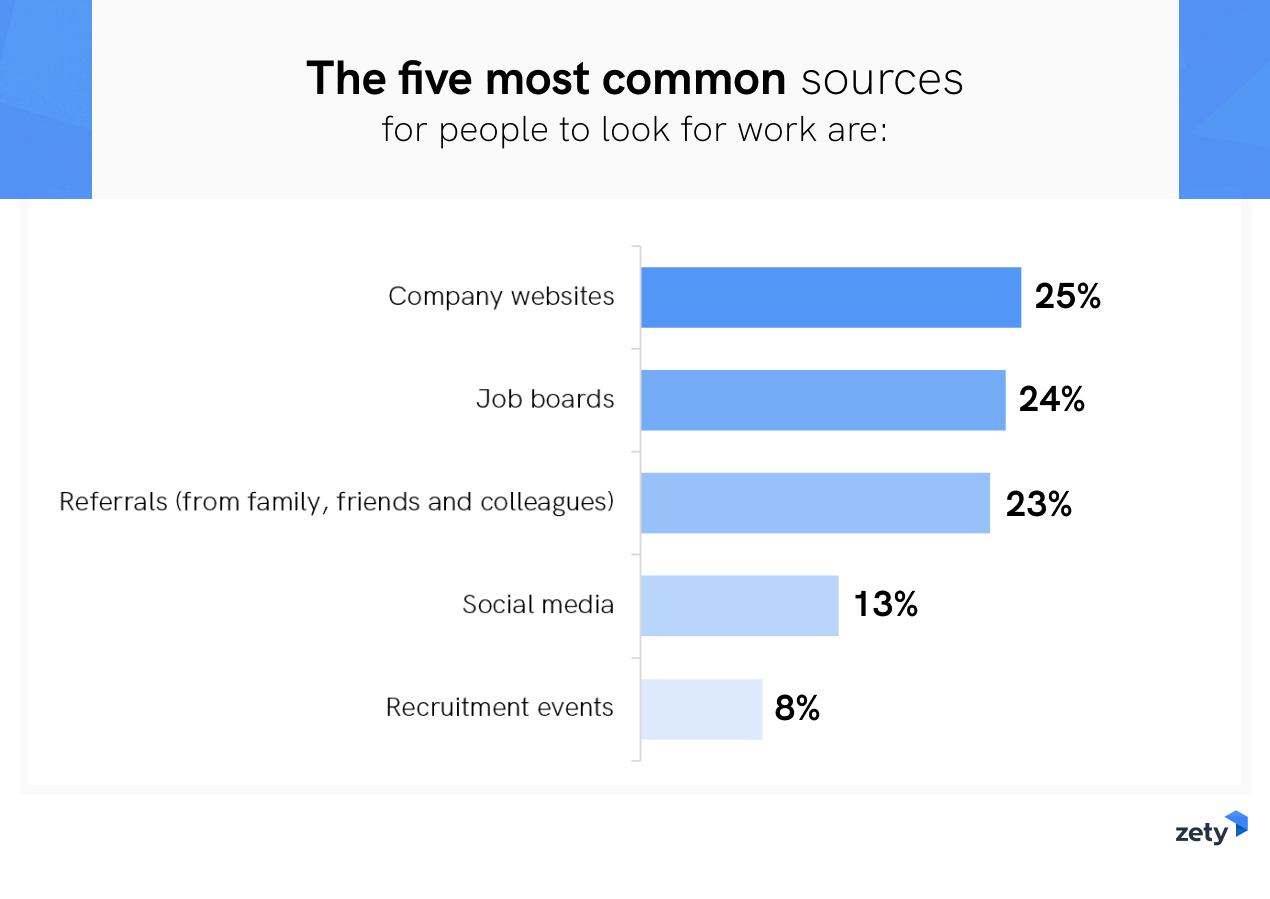
As you can see job boards and company websites are almost tied for first place. The results were surprising because we expected job boards to be the clear winner.
In reality, it appears candidates are being more focused in their job search, targeting specific company websites too. Clearly, many job seekers actively pick and choose who they want to work for and carefully research potential employers.
So how do they go about their due diligence when it comes to choosing a new job? We gave our respondents a list of the most popular methods of researching potential employers and asked them to choose which ones they used. Again, they were able to make multiple choices if they used more than one source. Here are our findings.
These are the top five sources job seekers use to research prospective employers:
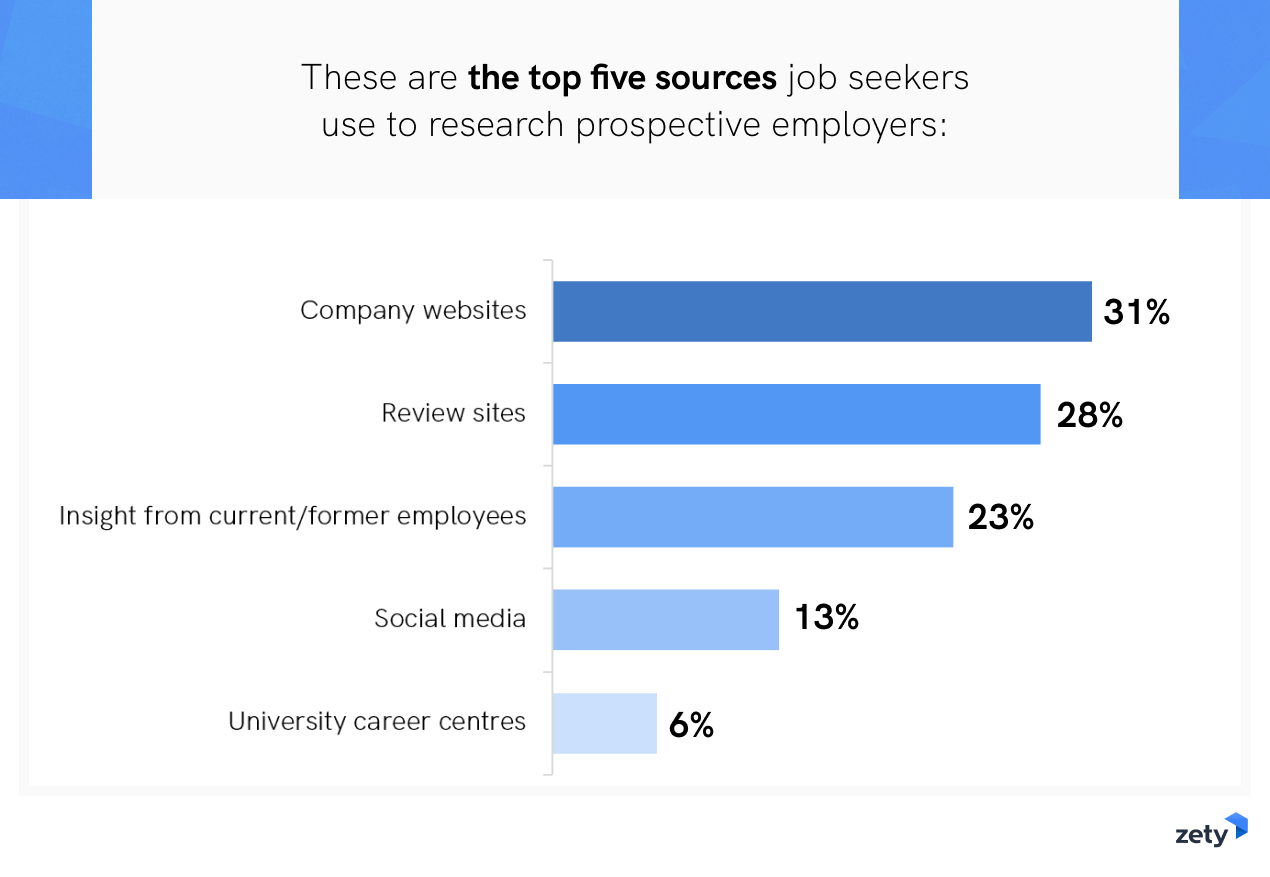
Company websites came out on top, beating review sites by a small margin. And it makes perfect sense that these fill the top two positions on our list. The company’s website is an obvious place to start, but it seems that candidates don’t automatically believe what they read—they seek an objective view too.
And they really do take their job research seriously. Less than 0.5% of our respondents said they don’t do any research at all.
Our findings are backed up by insights from the market leader in employee reviews, Glassdoor. Their research reveals that:
So when it comes to candidate experience our survey results show that careful research into a company’s reputation is key when it comes to deciding who to work for. We’ve also established that company websites and job boards are the most common methods for finding work.
But do these sources deliver the best candidates?
It seems surprising, but the answer is a definite no. It appears that quantity doesn’t equal quality when it comes to recruitment.
Studies reveal the best candidates actually come from employee referrals, professional networking sites and internal hires. Sources that aren’t even close to being the most popular job search methods for most candidates.
Here’s where recruiters say the best talent comes from.
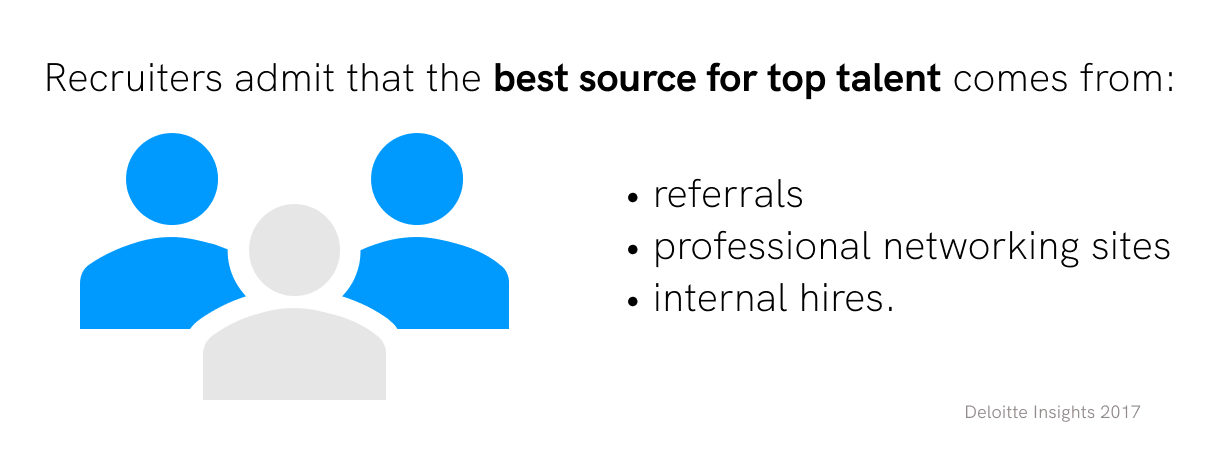
So why the disconnect? The majority of candidates look for jobs and research employers on job boards and company websites. But these aren’t the sources of the best candidates.
We’d suggest that job adverts and company websites aren’t effectively communicating company values, benefits and desired qualities in a candidate. Companies need to develop and communicate a compelling employer brand to attract the best candidates.
According to LinkedIn, 75% of applicants consider an employer brand before applying. And companies with good employer branding attract 50% more qualified applicants with a 50% reduction in hiring cost.
Those numbers speak for themselves. Companies looking to improve their hiring process would do well to examine their brand communication.
However, when it comes to leadership roles, improving brand communication may not be enough. In that case it's worth looking into other ways to effectively recruit managerial talent. A good method is using executive search software.
But let’s imagine a candidate has successfully found a job and researched the employer. How much time do they actually spend preparing and submitting their application?
Watching the Clock—How Long Does it Take to Submit a Job Application?
How much time and effort do jobseekers put into the application process? That is, preparing and submitting their application. It’s probably more than you think. We asked our respondents how much time they spent preparing and submitting an application, giving them options ranging from 30 minutes to an hour up to 4–5 hours.
We found that:
That figure was an average of all respondents. But split by gender it appears that men are a bit slower than women, taking an extra 15 minutes to grind through the application process.
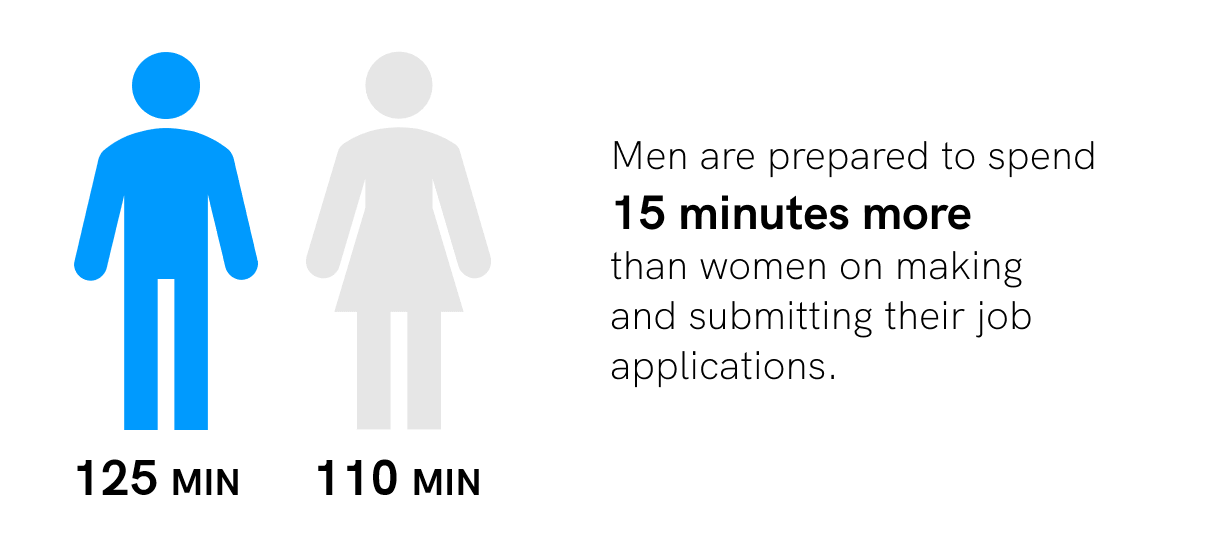
And in another interesting split, school-leavers spent on average half an hour less on submitting applications than university graduates.
But all this time spent on job applications is a two-edged sword. Extra time researching and preparing is always a good idea. The problem arises when it comes to the time taken to submit that perfectly polished CV and cover letter online.
Here’s what happens when the submission process takes too long.
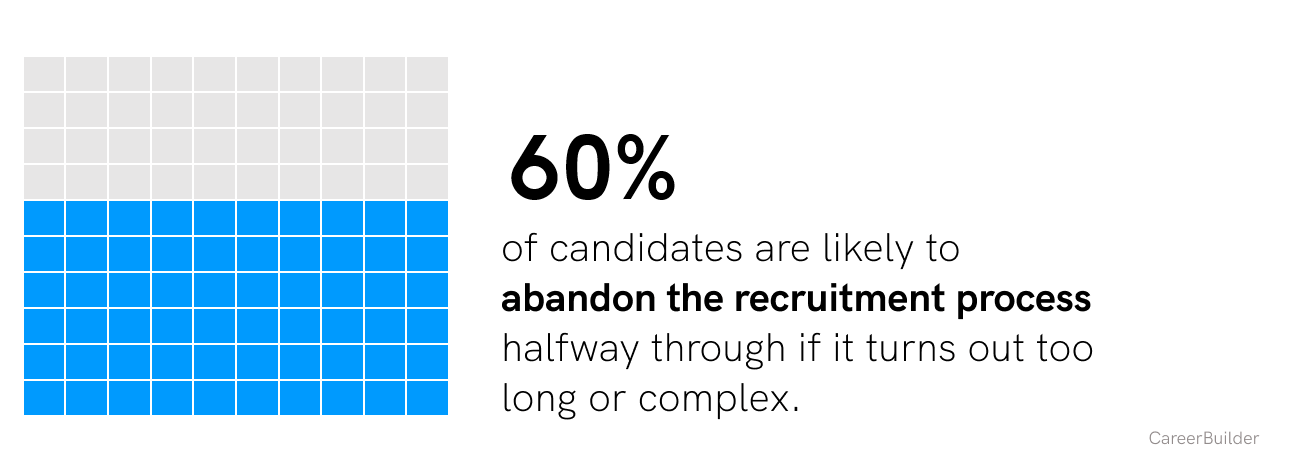
Studies show 60% of candidates have given up on an online application process because it was too long or complex. That means losing the majority of candidates, a real blow to sourcing the best talent.
In the same survey 50% of employers thought a long submission process was a good thing, as it weeds out undesirable candidates. But it’s actually the opposite that’s true. A good candidate doesn’t need to waste their time. They’ll just move onto the next opportunity. It’s the more desperate candidates who’ll persevere.
Worse, it’s reputationally and financially damaging to have an excessively long application process. Research also revealed that if the application process is too long:
- 42% of candidates would never apply for a job with the company again.
- 22% would tell others not to work at that company.
- 9% would not purchase products and services from that company as a result.
Do it right though and the benefits are clear. If the application process is positive (even if they weren’t hired):
- 56% of candidates would consider working for that company in future.
- 37% would recommend the company to others as a potential employer.
- 23% would be more likely to purchase products and services from that company as a result.
Speeding up the process is key, and it can also bring a massive boost to the number of candidates who apply. Data from recruitment company Appcast shows conversion rates on job adverts can be boosted by 365% if the application process takes less than five minutes.
It’s also worth optimising for mobile devices too. 80% of mobile users will abandon a website not optimised for mobile. And it better load quickly. 53% of mobile users will abandon a page that takes more than three seconds to load.
The key takeaway is clear.
Moving on, we asked our respondents how long they expected the entire job search process to take, from looking for a vacancy to accepting an offer.
Go to Whoa—From Starting the Search to Accepting an Offer
We gave our respondents a series of options to express their views on how long the job search should take, from start to finish. These ranged from 1–3 months to more than one year. Here’s what their thoughts were.
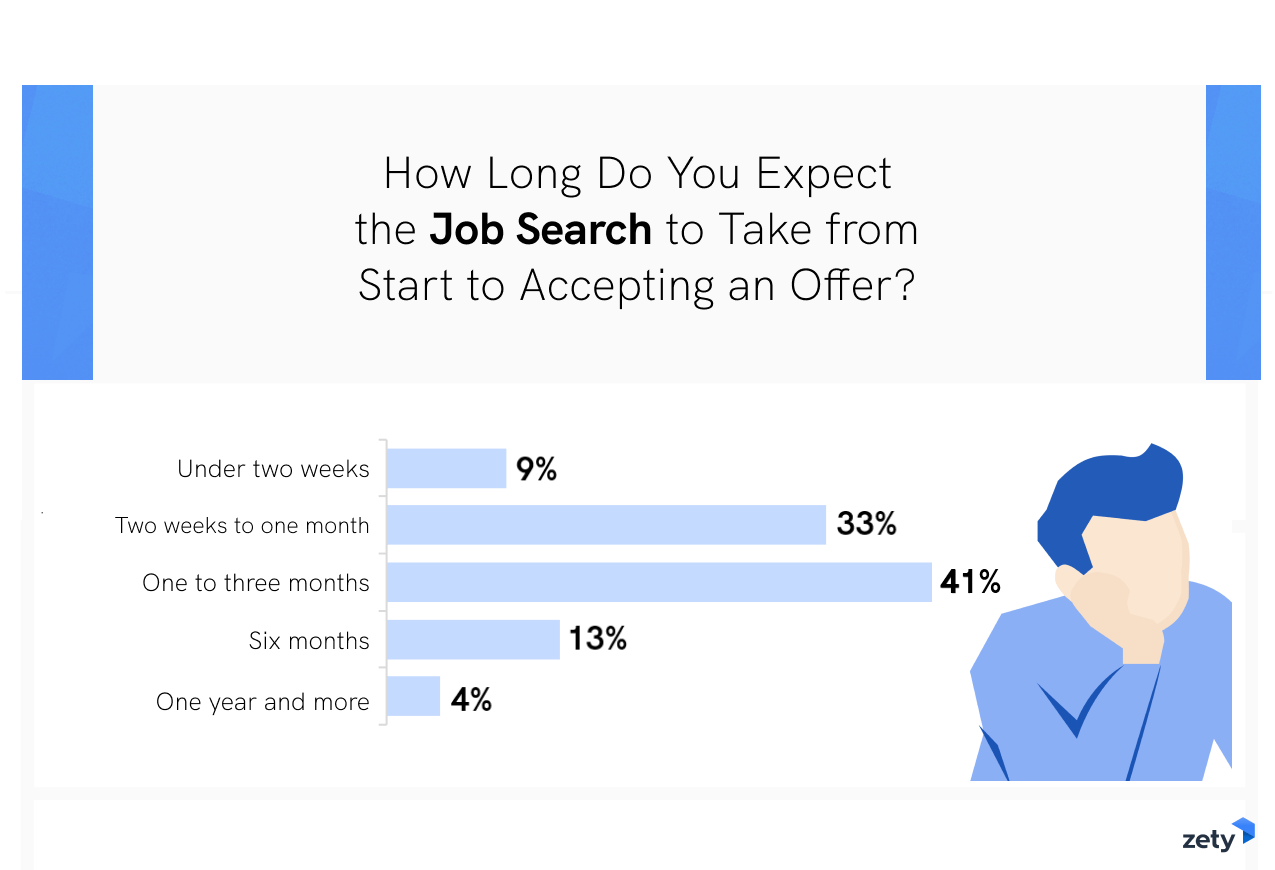
So the majority of candidates, 82%, thought their job search would take less than three months. This is all well and good if you’re currently working and have that safety net in place. But are these safe assumptions to make if you’re unemployed?
The latest available government statistics show the average duration of unemployment is:
- 0–3 months for 44% of jobseekers
- 3–12 months for 31% of jobseekers
- More than one year for 25% of job seekers
And those government statistics were gathered before the coronavirus pandemic and the economic damage it’s inflicted. So we’d expect the average time of unemployment to be longer moving forward.
Next, to examine the length of the recruitment process in more detail we asked—
How Long Do Candidates Expect It to Take From the First Interview to Receiving a Job Offer?
As with the previous question, we gave our respondents a series of choices, this time ranging from 1–2 weeks to more than six weeks. Here’s what they expected.

So the majority of candidates expect it to take just 1–2 weeks to proceed from the first interview to the job offer. But in reality, the average hire time is actually twice as long, 28.6 days in the UK.
Turns out finding a new job takes longer than most people expect. Not only does it take time to find the right job advert, but the whole recruitment process can take a month on average. You need a strong motivation to last that long.
And the candidate motivation is what we investigated next. We’ve asked our respondents what motivates them to choose a particular employer? Let’s look at different aspects of the job offer and common job benefits.
That’s the Job for Me—Key Factors in Deciding Which Job to Pursue
We asked our respondents to rate the importance of a list of factors when it comes to choosing to apply for a job. They were able to rank the importance of each factor, which we then aggregated into three categories, unimportant, neutral and important.
Here are the top 10 factors candidates consider when choosing a job.
Factor | Unimportant | Neutral | Important |
Salary | 2.18% | 5.45% | 92.38% |
Job responsibilities and duties | 2.08% | 8.71% | 89.21% |
Location | 2.77% | 10.20% | 87.03% |
Career growth opportunities | 7.62% | 19.90% | 72.48% |
Company reputation | 9.21% | 21.39% | 69.41% |
Flexible schedule / Remote work | 9.90% | 21.09% | 69.01% |
Professional training and development | 11.19% | 20.69% | 68.12% |
Company culture | 9.80% | 23.76% | 66.44% |
Industry | 14.75% | 27.03% | 58.22% |
The person I would be reporting to | 15.54% | 26.44% | 58.02% |
So cash is king when it comes to choosing a job, followed closely by responsibilities and location. This question gave us our most varied results between different demographics, with interesting differences emerging between generations and gender. Here’s how they were split.
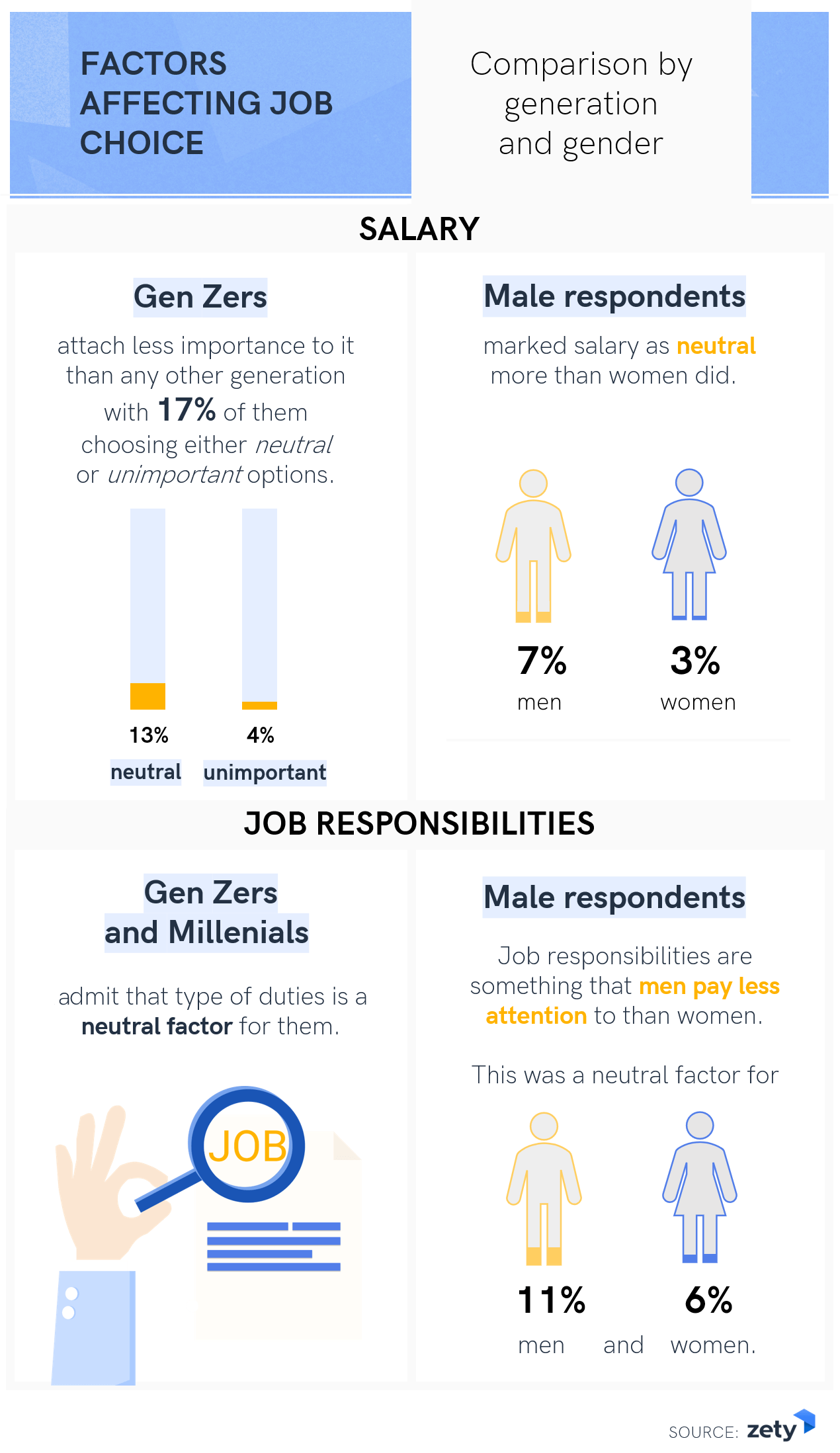
Most strikingly, the stereotype about younger people being entitled and money-obsessed doesn’t appear to be true. This is backed up by research from Deloitte, which revealed exactly the same thing.
What about working from home?
We’d expect remote working to become increasingly important as the way we work changes as a result of the coronavirus pandemic. Turns out search traffic on terms related to home working has almost tripled since March according to Statista. So companies would do well to take heed of shifting trends.
But what else is important for our respondents? Gym memberships, company outings or having a coffee machine in the workplace?
Central Perks—The Most Important Job Benefits
We asked candidates to rank the importance of the most common job benefits. As with the previous question, they were able to rank the importance of each factor, which we then aggregated into three categories.
Here’s what they told us.
Benefit | Unimportant | Neutral | Important |
Bonus incentives | 10.79% | 22.48% | 66.73% |
Professional training and development opportunities | 13.37% | 21.19% | 65.45% |
Share options / Equity | 27.03% | 30.59% | 42.38% |
Tuition assistance or reimbursement | 37.62% | 25.35% | 37.03% |
Wellness programmes / Gym memberships | 38.81% | 28.61% | 32.57% |
Company-sponsored events and activities | 39.60% | 28.61% | 31.78% |
Free food and drinks | 44.36% | 29.60% | 26.04% |
Once again, money comes out on top with bonuses being the top choice. But our respondents took learning seriously too with professional training and development coming a close second.
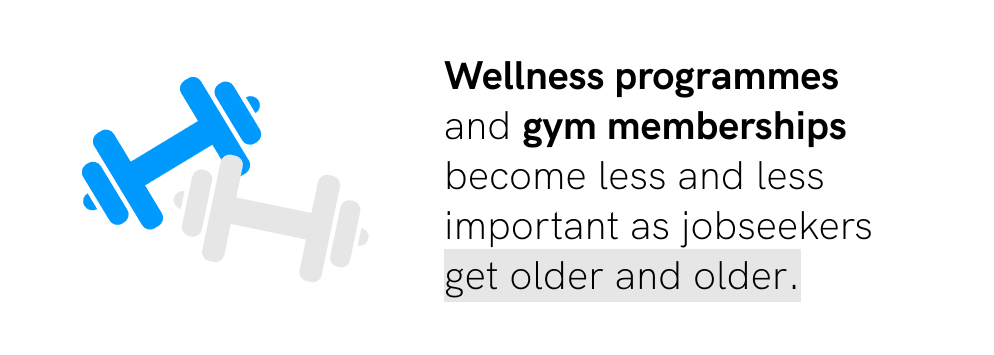
Results were evenly spread by age and gender for the most part. But wellness programmes and gym memberships revealed an interesting split. 30% of Gen Zers regard this as unimportant compared to 39% of Millennials, 44% of Gen Xers, and 45% of Baby Boomers.
So companies may want to examine the demographics of their workforce before investing in that corporate gym membership.
You’re Hired—What’s Vital for You to Accept a Job Offer
Our last survey question asked about the most important factor that helps candidates decide whether to accept a job offer or not. Respondents were able to choose from one of the following four options:
- Application and interviewing process and experience.
- Recruiter(s) I met during my interview(s).
- Speed at which I received an offer.
- Technology used in the interviewing process.
The application and interviewing process was the clear winner, being the top choice regardless of age and gender.
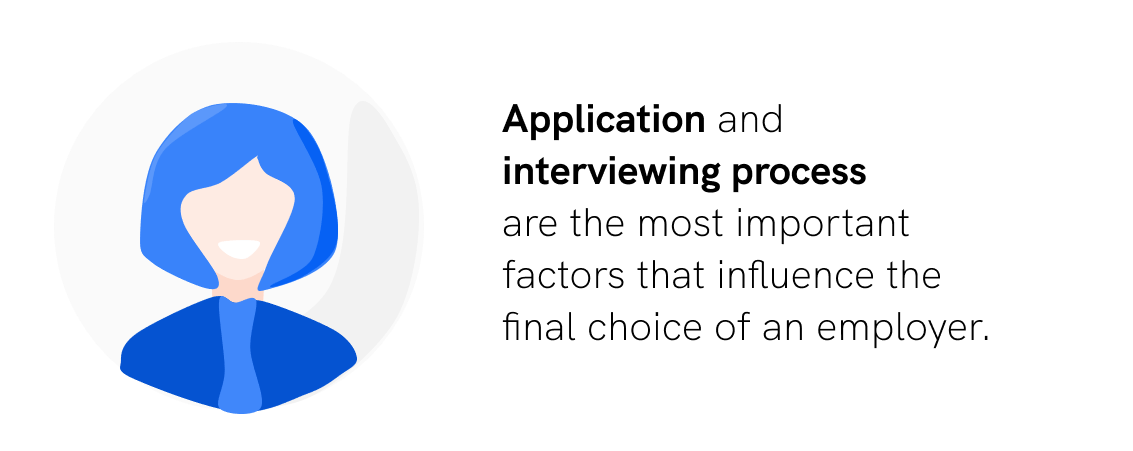
Recruiters came second, with one notable exception. Generation Xers rated the speed at which they receive a job offer as the second most important factor. Also, Generation Zers placed a higher importance on the recruiter than any other age group, with 36% ranking it as important.
Once more, we anticipate the coronavirus pandemic to change jobseekers' opinions on these factors moving forward. We’d expect technology used in the interviewing process to become more important to candidates as social distancing continues. High quality video interviewing capabilities will be a must.
Conclusions
The recruitment process doesn’t just influence the way an employer is perceived, it has a direct impact on the quality of candidates they attract. We discovered that:
- Company websites and job boards are the most important sources of information for finding a vacancy and researching a potential employer. But the best candidates come from employee referrals, professional networking sites and internal hires.
- On average, candidates spend around two hours preparing and submitting an application. But making the submission process too long and/or complicated actively deters good candidates.
- Most candidates expect their job search to take up to three months. But in reality the average duration of unemployment is longer than that.
- Salary is the most important factor affecting choice of job, closely followed by duties and location.
- The top employee benefits are bonuses and professional development. And the importance of gym memberships and wellness programmes changed with age.
One final thought. At several points we touched upon the importance of branding for companies to attract the best candidates. It’s not just us saying that either, 72% of recruitment leaders worldwide agree that employer branding has an important impact on hiring.
And the most important element of branding? Instilling trust. This is as true for branding a product for sale as it is for branding a company for candidates. And the current situation we’re all facing has made trust and credibility even more important.
The Edelman Trust Barometer released a special update for 2020 and the impact of the coronavirus pandemic. Their findings revealed that people wanted companies to do all they can to protect the well-being and financial security of their employees and suppliers, even if it meant incurring substantial financial losses.
If companies want to continue to attract high-quality talent they need to demonstrate their commitment to engaging with public sentiment in a compassionate and constructive manner. As the Edelman report states:
This is a moment when brands can prove that they put people, not profits, first. Respond with compassion and make a difference; this is the true test for purpose-driven leaders. The people are counting on us to deliver.
That sentiment is what companies should use as their touchstone for attracting the best talent. Build trust and credibility and the strongest candidates will surely take heed.
Methodology and Limitations
For this study, we collected answers from 1,010 respondents via Amazon's Mechanical Turk. The respondents consisted of 52% males and 48% females. Our sample's average age was 34 with a standard deviation of 11.
This self-report study investigated job seekers’ expectations and experiences regarding their job search. Respondents were asked 13 questions, most of which were scale-based or multiple choice. As experience is subjective, we understand that some participants and their answers might be affected by recency, attribution, exaggeration, self-selection, non-response or voluntary response bias. However, given the gender and age makeup of our large sample, the study can be generalized to the entire population. What is more, a review of literature and relevant studies suggests that results obtained in the survey corroborate results obtained hitherto, and add an extra layer of data by comparing subjective experience against third-party data on the reality of the job search.
Sources
https://archive.acas.org.uk/media/268/Recruiting-staff-guide/pdf/Recruiting_staff_guide.pdf
https://b2b-assets.glassdoor.com/60-hr-recruiting-stats-for-2018.pdf
https://careertrend.com/top-5-ways-people-jobs-7797.html
https://www.edelman.com/research/2017-edelman-trust-barometer
https://www.edelman.com/research/covid-19-brand-trust-report
https://b2b-assets.glassdoor.com/60-hr-recruiting-stats-for-2018.pdf
https://www.glassdoor.com/research/app/uploads/sites/2/2015/06/GD_Report_3.pdf
https://www.glassdoor.co.uk/employers/resources/top-35-facts-for-uk-recruiters/
https://officevibe.com/blog/12-recruiting-stats
https://www.pageuppeople.co.uk/resource/7-recruitment-trends-for-2020/
https://screen.careerbuilder.com/difference/docs/2017-candidate-experience-guide.pdf
About Us
Look no further than Zety to get the job you want. Use our cutting-edge CV builder online, and attach a cover letter with a proper format. Our expert-developed cover letter designs and cover letter samples will help you get it right.
About Zety’s Editorial Process
Our editorial team has thoroughly reviewed this article to ensure it follows Zety’s editorial guidelines. Our dedication lies in sharing our expertise and providing you with actionable career advice that offers you real value. Every year, the quality of our content attracts 40 million readers to our site. But that’s not all – we conduct original research to gain a detailed understanding of the labour market. We take pride in being cited by top universities and leading media outlets in the UK and worldwide.
Sources
- https://archive.acas.org.uk/media/268/Recruiting-staff-guide/pdf/Recruiting_staff_guide.pdf
- https://b2b-assets.glassdoor.com/60-hr-recruiting-stats-for-2018.pdf
- https://www2.deloitte.com/us/en/insights/focus/human-capital-trends/2017/predictive-hiring-talent-acquisition.html#endnote-sup-15
- https://www2.deloitte.com/us/en/pages/consumer-business/articles/understanding-generation-z-in-the-workplace.html
- https://www.ethnicity-facts-figures.service.gov.uk/work-pay-and-benefits/unemployment-and-economic-inactivity/length-of-time-spent-in-unemployment/latest
- https://b2b-assets.glassdoor.com/60-hr-recruiting-stats-for-2018.pdf
- https://www.glassdoor.com/research/app/uploads/sites/2/2015/06/GD_Report_3.pdf
- https://www.shrm.org/resourcesandtools/hr-topics/technology/pages/study-most-job-seekers-abandon-online-job-applications.aspx
- https://www.statista.com/statistics/1105696/remote-working-google-searches-worldwide-during-covid-19-outbreak/

![Childhood Dream Jobs [2021 Study]](https://cdn-images.zety.com/pages/dream_jobs_6.jpg?fit=crop&h=250&dpr=2)

